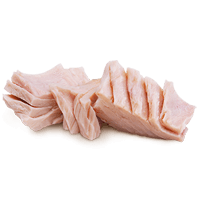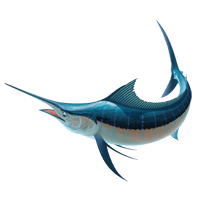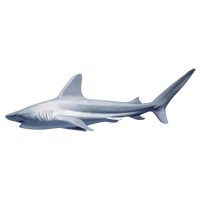Sardines nutrition: calories, carbs, GI, protein, fiber, fats
Fish, sardine, Atlantic, canned in oil, drained solids with bone
*all the values are displayed for the amount of 100 grams
Top nutrition facts for Sardines
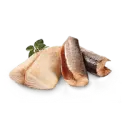
| Calories ⓘ Calories for selected serving | 208 kcal |
|
Glycemic index ⓘ
Source: The food is assumed to have 0 or no glycemic index bason on the fact that it has no carbs and that foods with 0 carbs have no glycemic index
Check out our Glycemic index chart page for the full list.
|
0 (low) |
| Net Carbs ⓘ Net Carbs = Total Carbohydrates – Fiber – Sugar Alcohols | 0 grams |
| Default serving size ⓘ Serving sizes are mostly taken from FDA's Reference Amounts Customarily Consumed (RACCs) | 1 oz (28.35 grams) |
| Acidity (Based on PRAL) ⓘ PRAL (Potential renal acid load) is calculated using a formula. On the PRAL scale the higher the positive value, the more is the acidifying effect on the body. The lower the negative value, the higher the alkalinity of the food. 0 is neutral. | 15.9 (acidic) |
| Oxalates ⓘ https://www.hsph.harvard.edu/nutrition-questionnaire-service-center/nutrient-tables-download-page/ | 0 mg |
Calcium ⓘHigher in Calcium content than 93% of foods
Cholesterol ⓘHigher in Cholesterol content than 93% of foods
Phosphorus ⓘHigher in Phosphorus content than 90% of foods
Protein ⓘHigher in Protein content than 87% of foods
Vitamin B12 ⓘHigher in Vitamin B12 content than 85% of foods
Sardines calories (kcal)
| Calories for different serving sizes of sardines | Calories | Weight |
|---|---|---|
| Calories in 100 grams | 208 | |
| Calories in 1 cubic inch | 33 | 16 g |
| Calories in 2 sardines | 50 | 24 g |
| Calories in 1 oz | 59 | 28.35 g |
| Calories in 1 cup, drained | 310 | 149 g |
| Calories for different varieties of sardines | Calories | Weight |
|---|---|---|
| Fish, sardine, Atlantic, canned in oil, drained solids with bone (this food) | 208 | 100 g |
| Fish, salmon, tipnuk, fermented (Alaska Native) | 159 | 100 g |
| Fish, sardine, Pacific, canned in tomato sauce, drained solids with bone | 185 | 100 g |
Sardines Glycemic index (GI)
Source:
The food is assumed to have 0 or no glycemic index bason on the fact that it has no carbs and that foods with 0 carbs have no glycemic index
Check out our Glycemic index chart page for the full list.
Mineral coverage chart
Mineral chart - relative view
Vitamin coverage chart
Vitamin A:
96µg of 900µg
11%
Vitamin E:
6.1mg of 15mg
41%
Vitamin D:
14µg of 20µg
72%
Vitamin C:
0mg of 90mg
0%
Vitamin B1:
0.24mg of 1mg
20%
Vitamin B2:
0.68mg of 1mg
52%
Vitamin B3:
16mg of 16mg
98%
Vitamin B5:
1.9mg of 5mg
39%
Vitamin B6:
0.5mg of 1mg
39%
Folate:
30µg of 400µg
7.5%
Vitamin B12:
27µg of 2µg
1118%
Vitamin K:
7.8µg of 120µg
6.5%
Vitamin chart - relative view
Macronutrients chart
Protein:
Daily Value: 49%
24.6 g of 50 g
24.6 g (49% of DV )
Fats:
Daily Value: 18%
11.5 g of 65 g
11.5 g (18% of DV )
Carbs:
Daily Value: 0%
0 g of 300 g
0 g (0% of DV )
Water:
Daily Value: 3%
59.6 g of 2,000 g
59.6 g (3% of DV )
Other:
4.3 g
4.3 g
Protein quality breakdown
Tryptophan:
828mg of 280mg
296%
Threonine:
3237mg of 1,050mg
308%
Isoleucine:
3402mg of 1,400mg
243%
Leucine:
6003mg of 2,730mg
220%
Lysine:
6780mg of 2,100mg
323%
Methionine:
2187mg of 1,050mg
208%
Phenylalanine:
2883mg of 1,750mg
165%
Valine:
3804mg of 1,820mg
209%
Histidine:
2175mg of 700mg
311%
Fat type information
Saturated fat:
1.5 g
Monounsaturated fat:
3.9 g
Polyunsaturated fat:
5.1 g
All nutrients for Sardines per 100g
| Nutrient | Value | DV% | In TOP % of foods | Comparison |
| Vitamin A | 32µg | 4% | 39% | |
| Calories | 208kcal | 10% | 46% |
4.4 times more than Orange
|
| Protein | 25g | 59% | 13% |
8.7 times more than Broccoli
|
| Fats | 11g | 18% | 30% |
2.9 times less than Cheese
|
| Vitamin C | 0mg | 0% | 100% |
N/A
|
| Net carbs | 0g | N/A | 75% |
N/A
|
| Carbs | 0g | 0% | 100% |
N/A
|
| Cholesterol | 142mg | 47% | 7% |
2.6 times less than Egg
|
| Vitamin D | 4.8µg | 48% | 39% |
2.2 times more than Egg
|
| Magnesium | 39mg | 9% | 26% |
3.6 times less than Almonds
|
| Calcium | 382mg | 38% | 7% |
3.1 times more than Milk
|
| Potassium | 397mg | 12% | 18% |
2.7 times more than Cucumber
|
| Iron | 2.9mg | 37% | 22% |
1.1 times more than Beef broiled
|
| Sugar | 0g | N/A | 100% |
N/A
|
| Fiber | 0g | 0% | 100% |
N/A
|
| Copper | 0.19mg | 21% | 33% |
1.3 times more than Shiitake
|
| Zinc | 1.3mg | 12% | 48% |
4.8 times less than Beef broiled
|
| Phosphorus | 490mg | 70% | 10% |
2.7 times more than Chicken meat
|
| Sodium | 307mg | 13% | 34% |
1.6 times less than White bread
|
| Vitamin E | 2mg | 14% | 40% |
1.4 times more than Kiwi
|
| Manganese | 0.11mg | 5% | 60% | |
| Selenium | 53µg | 96% | 21% | |
| Vitamin B1 | 0.08mg | 7% | 56% |
3.3 times less than Pea raw
|
| Vitamin B2 | 0.23mg | 17% | 39% |
1.7 times more than Avocado
|
| Vitamin B3 | 5.2mg | 33% | 31% |
1.8 times less than Turkey meat
|
| Vitamin B5 | 0.64mg | 13% | 50% |
1.8 times less than Sunflower seeds
|
| Vitamin B6 | 0.17mg | 13% | 53% |
1.4 times more than Oats
|
| Vitamin B12 | 8.9µg | 373% | 15% |
12.8 times more than Pork
|
| Vitamin K | 2.6µg | 2% | 62% |
39.1 times less than Broccoli
|
| Folate | 10µg | 3% | 62% |
6.1 times less than Brussels sprouts
|
| Saturated fat | 1.5g | 8% | 53% |
3.9 times less than Beef broiled
|
| Choline | 75mg | 14% | 58% | |
| Monounsaturated fat | 3.9g | N/A | 38% |
2.5 times less than Avocado
|
| Polyunsaturated fat | 5.1g | N/A | 17% |
9.2 times less than Walnut
|
| Tryptophan | 0.28mg | 0% | 53% |
1.1 times less than Chicken meat
|
| Threonine | 1.1mg | 0% | 53% |
1.5 times more than Beef broiled
|
| Isoleucine | 1.1mg | 0% | 54% |
1.2 times more than Salmon raw
|
| Leucine | 2mg | 0% | 54% |
1.2 times less than Tuna Bluefin
|
| Lysine | 2.3mg | 0% | 51% |
5 times more than Tofu
|
| Methionine | 0.73mg | 0% | 49% |
7.6 times more than Quinoa
|
| Phenylalanine | 0.96mg | 0% | 56% |
1.4 times more than Egg
|
| Valine | 1.3mg | 0% | 53% |
1.6 times less than Soybean raw
|
| Histidine | 0.73mg | 0% | 57% |
Equal to Turkey meat
|
| Caffeine | 0mg | 0% | 100% | |
| Omega-3 - EPA | 0.47g | N/A | 32% |
1.5 times less than Salmon
|
| Omega-3 - DHA | 0.51g | N/A | 33% |
2.9 times less than Salmon
|
| Omega-3 - DPA | 0g | N/A | 100% |
N/A
|
Check out similar food or compare with current
NUTRITION FACTS LABEL
Nutrition Facts
___servings per container
Serving Size ______________
Serving Size ______________
Amount Per 100g
Calories 208
% Daily Value*
18%
Total Fat
11g
6.9%
Saturated Fat 1.5g
0
Trans Fat
0g
47%
Cholesterol 142mg
13%
Sodium 307mg
0
Total Carbohydrate
0g
0
Dietary Fiber
0g
Total Sugars 0g
Includes ? g Added Sugars
Protein
25g
Vitamin D
193mcg
24%
Calcium
382mg
38%
Iron
2.9mg
37%
Potassium
397mg
12%
*
The % Daily Value (DV) tells you how much a nutrient in a serving of food contributes to a daily diet. 2,000 calories a day is used for general nutrition advice.
Health checks
ⓘ
Dietary cholesterol is not associated with an increased risk of coronary heart disease in healthy individuals. However, dietary cholesterol is common in foods that are high in harmful saturated fats.
Source
Low in Cholesterol
ⓘ
Trans fat consumption increases the risk of cardiovascular disease and mortality by negatively affecting blood lipid levels.
Source
No Trans Fats
ⓘ
Saturated fat intake can raise total cholesterol and LDL (low-density lipoprotein) levels, leading to an increased risk of atherosclerosis. Dietary guidelines recommend limiting saturated fats to under 10% of calories a day.
Source
Low in Saturated Fats
ⓘ
While the consumption of moderate amounts of added sugars is not detrimental to health, an excessive intake can increase the risk of obesity, and therefore, diabetes.
Source
Low in Sugars
Sardines nutrition infographic
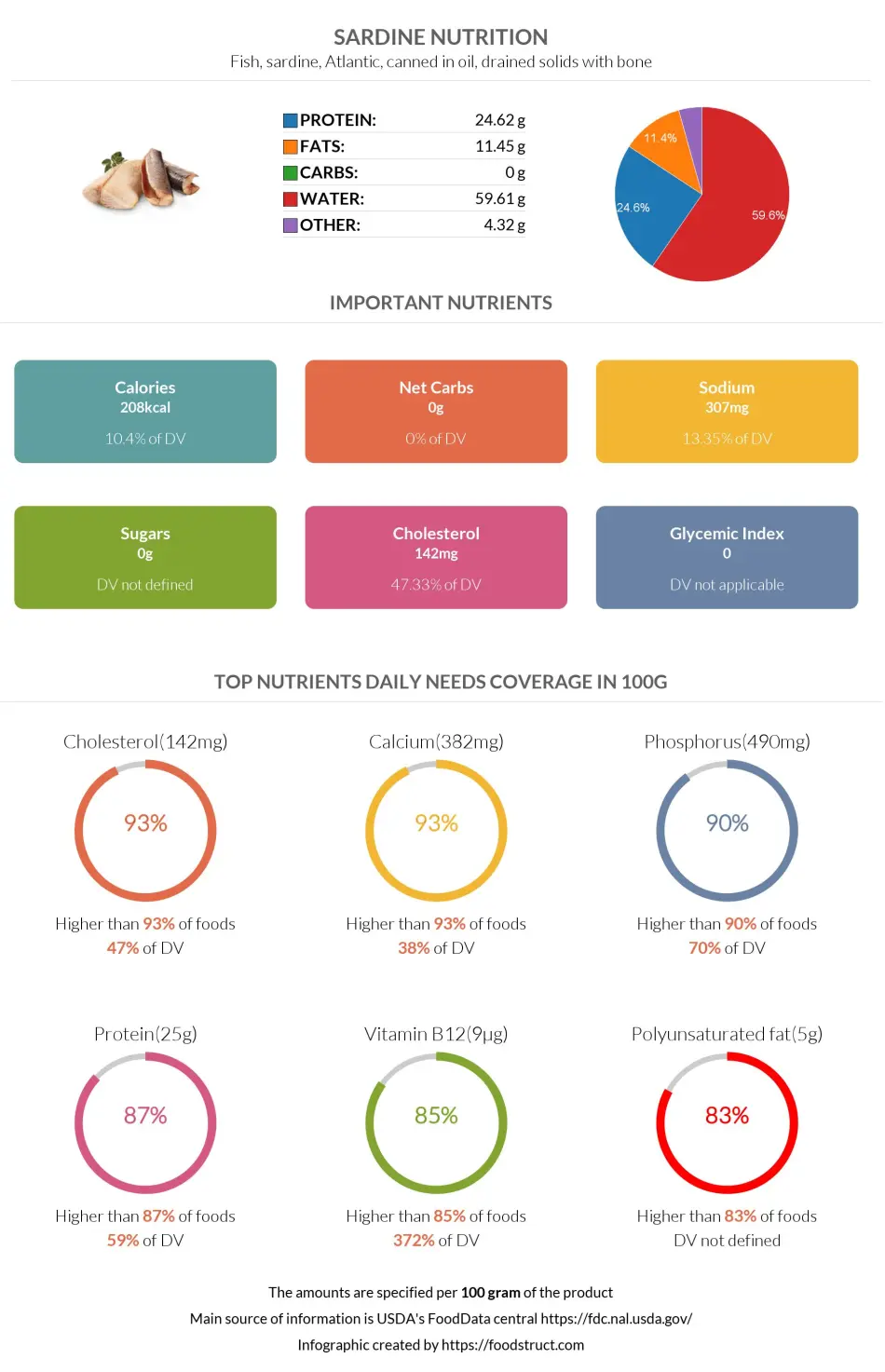
Infographic link
References
All the values for which the sources are not specified explicitly are taken from FDA’s Food Central. The exact link to the food presented on this page can be found below.
